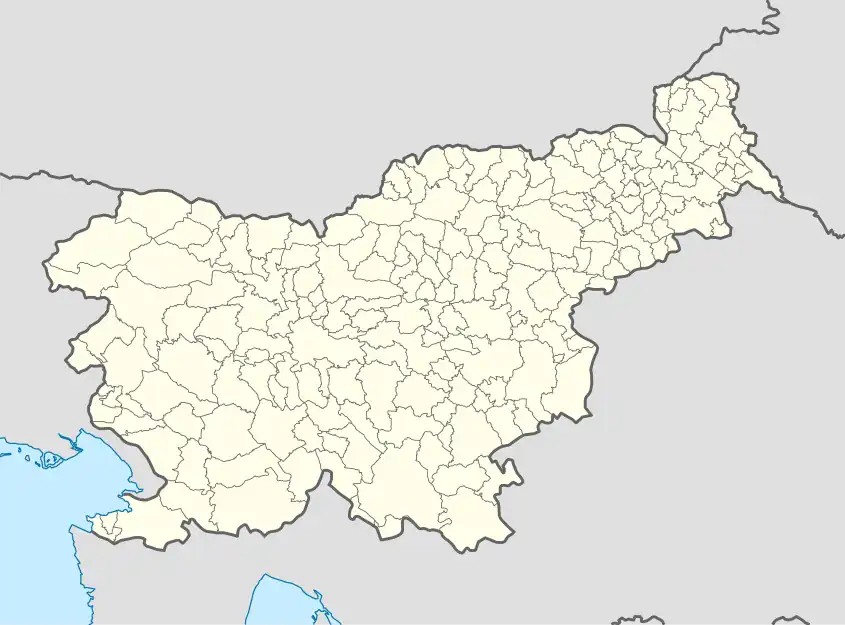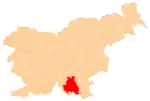Dolga Vas | |
|---|---|
 | |
 Dolga Vas Location in Slovenia | |
| Coordinates: 45°37′17.96″N 14°52′39.98″E / 45.6216556°N 14.8777722°E | |
| Country | |
| Traditional region | Lower Carniola |
| Statistical region | Southeast Slovenia |
| Municipality | Kočevje |
| Area | |
| • Total | 6.49 km2 (2.51 sq mi) |
| Elevation | 460.3 m (1,510.2 ft) |
| Population (2002) | |
| • Total | 740 |
| [1] | |
Dolga Vas (pronounced [ˈdoːu̯ɡa ˈʋaːs]; Slovene: Dolga vas, German: Grafenfeld[2][3] or Krapfenfeld,[4][5] Gottscheerish: Kropfnwold[5][6] or Kropfmvolt[7]) is a settlement on the Rinža River southeast of the town of Kočevje in southern Slovenia. The area is part of the traditional region of Lower Carniola and is now included in the Southeast Slovenia Statistical Region.[8]
Name
The Slovene name Dolga vas literally means 'long village'. The Slovene name refers to the layout of the settlement along the road.[5] The German name Krapfenfeld (recorded in the 1574 land registry and also in later sources as Grafenfeld) is derived from the surname Krapf, literally meaning 'Krapf's field'.[5][6][9] The name Grafenfeld is thus a corruption of Krapfenfeld and not vice versa.[9][10][11] Popular etymology derived the name from krapfen 'doughnut', resulting in the jocular nickname Kropfmvrassarə 'doughnut eaters' for the residents of the village.[7]
History
In the land registry of 1574, Dolga Vas had eight full farms subdivided into 16 half-farms,[12] corresponding to between 110 and 115 inhabitants.[6] The 1770 census recorded 52 houses in the village.[6][9] In 1910 the village had 86 houses and a population of 266, of whom 52 households were of German speakers.[6] Before the Second World War, the village had 90 houses and a population of 457.[13] The Gottschee German inhabitants were evicted at the end of 1941, after which new settlers came to the village from various parts of Slovenia. On 11 May 1942, Italian troops killed seven people in the village.[12] The Dolga Vas volunteer fire department became a founding unit of the Kočevje municipal fire department on 28 August 1955.[14]
Church
Dolga Vas had a chapel of ease dedicated to the Holy Name of Jesus.[13] The church stood in the middle of the village and was dedicated on 15 June 1717. It originally had a bell-gable or bell-cot, but after a second bell was purchased in 1792 a bell tower was built in 1804, incorporated into the nave. The church was renovated in 1885, when a tile roof and clock were added to the bell tower. The church originally had a shingled roof, but shortly before the Second World War this was replaced with concrete tiles and a metal roof over the chancel. Although it was in good condition after the war, it was completely destroyed on 18 June 1956. In 2006 the villagers erected a stone wayside shrine at the site of the former church. Holy Name Church was considered a rare architectural treasure from this period in the Kočevje region because of its rich furnishings created by some of the most prominent Baroque craftsmen in Carniola.[15]
Notable people
Notable people that were born or lived in Dolga Vas include:
References
- ↑ Statistical Office of the Republic of Slovenia
- ↑ Leksikon občin kraljestev in dežel zastopanih v državnem zboru, vol. 6: Kranjsko. 1906. Vienna: C. Kr. Dvorna in Državna Tiskarna, p. 38.
- ↑ Ferenc, Mitja. 2007. Nekdanji nemški jezikovni otok na kočevskem. Kočevje: Pokrajinski muzej, p. 4.
- ↑ Intelligenzblatt zur Laibacher Zeitung, no. 141. 24 November 1849, p. 26.
- 1 2 3 4 Simonič, Ivan. 1935. "Kočevarji v luči krajevnih in ledinskih imen." Glasnik Muzejskega društva za Slovenijo 16: 61–81 and 106–123, p. 63.
- 1 2 3 4 5 Petschauer, Erich. 1980. "Die Gottscheer Siedlungen – Ortsnamenverzeichnis." In Das Jahrhundertbuch der Gottscheer (pp. 181–197). Klagenfurt: Leustik.
- 1 2 Tschinkel, Wilhelm. 1931. Gottscheer Volkstum in Sitte, Brauch, Märchen, Sagen, Legenden und anderen volkstümlichen Überlieferungen. Author, p. 210.
- ↑ Kočevje municipal site
- 1 2 3 Schröer, Karl Julius. 1870. Wörterbuch der Mundart von Gottschee. Vienna: K. u. k. Staatsdruckerei, p. 411.
- ↑ Elze, Theodor. 1900. "Die Abstammung der Gotschewer (Gottscheer) (Sind die Gotschewer fränkischen oder bairischen Stammes?)." Mitteilungen des Musealvereins für Krain 13: 93–132, p. 129.
- ↑ Kos, Milko. 1985. Srednjeveška zgodovina Slovencev. Ljubljana: Slovenska matica Ljubljana, p. 230.
- 1 2 3 Savnik, Roman, ed. 1971. Krajevni leksikon Slovenije, vol. 2. Ljubljana: Državna založba Slovenije, p. 220.
- 1 2 Krajevni leksikon Dravske Banovine. 1937. Ljubljana: Zveza za tujski promet za Slovenijo, p. 215.
- ↑ Gasilska zveza Kočevja: Zgodovina Archived 2011-06-01 at the Wayback Machine (in Slovene)
- ↑ Dolga vas: Podružnična cerkev Presvetega imena Jezusovega / Grafenfeld: Filialkirche Name Jesu (in Slovene and German)
- ↑ Bokal, Ljudmila, ed. 2008. Čebelarski terminološki slovar. Ljubljana: Založba ZRC, ZRC SAZU and Lukovica: Čebelarska zveza Slovenije, p. 254.
- ↑ Prof. Dr. agr. habil., Dr. h. c. Wilhelm Lampeter (in German)
External links
 Media related to Dolga Vas at Wikimedia Commons
Media related to Dolga Vas at Wikimedia Commons- Dolga Vas on Geopedia
- Pre–World War II map of Dolga Vas with oeconyms and family names
